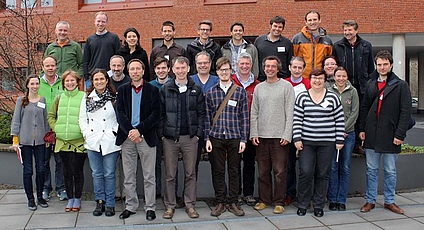sTREEDIV - Using Tree Diversity as an Insurance for the Stable Functioning of Forest Ecosystems
First meeting: 17.-21.03.2014
associated postdoc:
Simon Bilodeau-Gauthier
iDiv member:
Harald Auge
Project summary:
Forests provide multiple ecosystem services to humans including wood production, water supply and carbon sequestration. Ecological theory - the insurance hypothesis - suggests that diverse forests may be more effective at supplying these ecosystem services, providing greater stability over time and greater resistance and resilience to global change. Reviews of existing data generally support a positive diversity effect, but these data do not derive from experiments specifically designed to test the effect of tree diversity on forest function. TreeDivNet (www.treedivnet.ugent.be) is a global network of field experiments specifically designed to estimate the impact of tree diversity on forest functioning and stability in different biomes around the world. We propose a workshop that will, for the first time, bring together key participants from this network to compile a database on tree mortality and to conduct a combined analysis that tests for effects of tree diversity and estimates its impact on future forest structure: when the mortality rate of a species is high tree density in monoculture might become too low to ensure canopy closure and adequate ecosystem service provision. Mixed stands that combine species with different mortality rates under different conditions will reduce this risk - the so-called insurance value of biodiversity - since species with lower mortality can compensate for others with higher rates. We will use the estimated mortality rates to parameterize simulation models that will predict future tree densities in the monocultures and mixtures of the TreeDivNet experiments and to test this potential insurance effect of tree diversity.
Participants:
Eric Allan (University of Bern); Harald Auge (Helmholtz Centre for Environmental Research – UFZ); Lander Baeten (Ghent University); Nadia Barsoum (Forest Research); Simon Bilodeau-Gauthier (German Centre for Integrative Biodiversity Research (iDiv) Halle-Jena-Leipzig); Helge Bruelheide (Martin Luther University Halle Wittenberg); Simone Cesarz (Friedrich Schiller University Jena); Gislene Ganade (UFRN, Federal University of Rio Grande do Norte); Nathaly R Guerrero (Friedrich-Schiller-Universitat Jena); Josephine Haase (Albert-Ludwigs University Freiburg); Andrew Hector (University of Oxford); Hervé Jactel (INRA); Yulia Koricheva (Royal Holloway University of London); Simone Mereu (University of Sassari); Bart Muys (KU Leuven); Alain Paquette (UQAM); John Parker (Smithsonian); Michael Perring (The University of Western Australia); Quentin Ponette (Universite catholique de Louvain (UCL)); Catherine Potvin (McGill University); Claire Salisbury (McGill University); Michael Scherer-Lorenzen (University of Freiburg); Andy Smith (Bangor University); Sean Tuck (University of Oxford); Thomas Van de Peer (KU Leuven); Kris Verheyen (Ghent University); Henrik Hartman (MPI Biogeochemistry); Stefan Trogisch (University of Halle)

